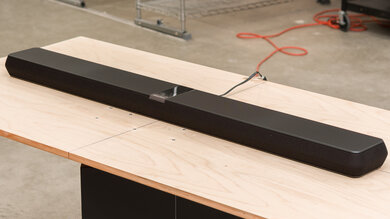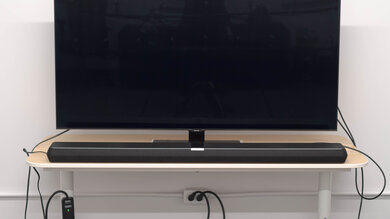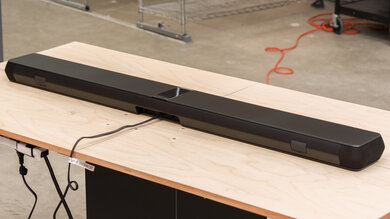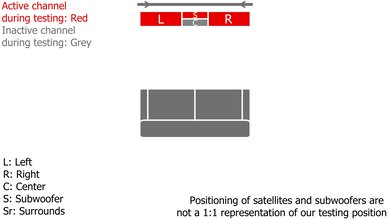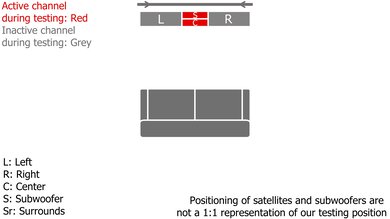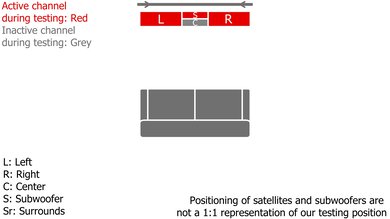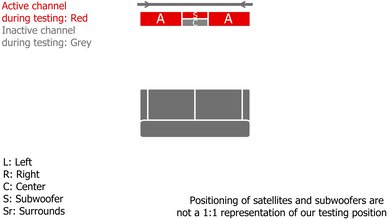The Bowers & Wilkins Panorama 3 is a 2022 release, and it's the first Dolby Atmos soundbar available from the manufacturer. It's a standalone bar with thirteen individual drivers arranged in a 3.1.2 setup. Overall, it's designed for simplicity, so there aren't a lot of extra settings or calibration modes available. Compared to other premium standalone bars on the market, it doesn't offer additional subwoofers or satellites, either - though there are two subwoofers integrated into the bar itself.
Our Verdict
The Bowers & Wilkins Panorama 3 is fair for mixed usage. It's a premium-looking standalone bar that offers Dolby Atmos support, but unfortunately, it doesn't sound as good as it looks. Its default sound is dark and muddy due to its recessed treble and lack of bass, meaning that voices and lead instruments are muffled in the mix. It doesn't provide an immersive listening experience with movies, either, due to its narrow soundstage. Since there aren't a lot of customization features on hand, it's not easy to adjust its performance to your liking.
-
Bass and treble adjustments.
-
Built-in Alexa support.
-
Lacks low-bass.
-
Soundstage isn't very wide.
The Bowers & Wilkins Panorama 3 is okay for dialogue-heavy content like podcasts and TV shows. It's a 3.1.2 setup with a discrete center channel, so voices are accurately localized within the soundstage. However, voices aren't reproduced with complete clarity due to the dip in the treble and the peak in the low-mids, resulting in a dark and muffled sound. There's no dialogue enhancement feature on hand to improve the clarity.
-
Bass and treble adjustments.
-
No dialogue enhancement mode.
The Bowers & Wilkins Panorama 3 is okay for music. Out-of-the-box, it has a dark and muddy sound due to its recessed treble and lack of bass. Voices and lead instruments are muffled in certain tracks, and sound is contained around the bar. Though there are two integrated subwoofers, it can't reproduce the deep thump and rumble in the low-bass found with bass-heavy genres like hip-hop and EDM. Unfortunately, aside from its bass and treble adjustments, there aren't a lot of customization tools to help you adjust its sound, either.
-
Bass and treble adjustments.
-
Gets loud.
-
Lacks low-bass.
-
Soundstage isn't very wide.
The Bowers & Wilkins Panorama 3 is alright for movies. There's Dolby Atmos support, and it can also playback surround sound formats like Dolby Digital, though it has to downmix them into stereo to play them. Unfortunately, the lack of bass is evident, especially with action-packed scenes. It doesn't offer a very wide and immersive sound, even compared to other standalone soundbars.
-
Bass and treble adjustments.
-
Gets loud.
-
Soundstage isn't very wide.
-
Disappointing Atmos performance.
- 6.7 Mixed Usage
- 6.8 Dialogue/TV Shows
- 6.8 Music
- 6.5 Movies
- Updated May 31, 2022: Review published.
- Updated May 25, 2022: Early access published.
- Updated May 13, 2022: Our testers have started testing this product.
- Updated May 12, 2022: The product has arrived in our lab, and our testers will start evaluating it soon.
- Updated May 09, 2022: We've purchased the product and are waiting for it to arrive in our lab.
- Updated May 06, 2022: The product has won our suggestion poll, so we'll buy and test it soon.
Differences Between Sizes And Variants
The Bowers & Wilkins Panorama 3 is available in 'Black', and the label for our model is here.
If you come across another version of this bar, let us know in the discussions, and we'll update our review.
Compared To Other Soundbars
The Bowers & Wilkins Panorama 3 is a premium standalone setup with Dolby Atmos support. It doesn't achieve the same immersive sound as other standalone setups like the Sonos Arc or the Bose Smart Soundbar 900, and its dark and muddy sound is pretty disappointing. By design, there aren't a lot of customization tools, which is a shame if you don't like its performance.
See also our recommendations for the best all-in-one soundbars, the best soundbars, and the best Dolby Atmos soundbars.
The Sonos Arc and the Bowers & Wilkins Panorama 3 are premium standalone soundbars. However, the Sonos is better overall. It has better soundstage, surround, and Atmos performances and has more sound enhancement features. In addition, its default sound is more neutral, especially in the mids, so voices are clearer and more detailed in the mix.
The Bowers & Wilkins Panorama 3 and the Bose Smart Soundbar 900 are both premium standalone setups, but the Bose is better overall. It has better soundstage, surround, and Atmos performances. Also, there are more sound enhancement features on hand. You can also upgrade it with a sub and satellites down the line, unlike the B&W.
The Samsung HW-Q950A and the Bowers & Wilkins Panorama 3 are two very different setups: the Samsung is an 11.1.4 setup with a discrete subwoofer and satellites included, while the Bowers & Wilkins is a standalone bar. Still, the Samsung soundbar is better overall. It can reproduce more bass right out of the box, and it has better surrounds and Atmos performances. Also, it comes with more sound enhancement features.
The Sennheiser AMBEO Soundbar MAX is better than the Bowers & Wilkins Panorama 3. While they're both premium standalone setups, the Sennheiser has better soundstage, surround, and Atmos performances. It comes with more sound enhancement features, too. Also, the Sennheiser's integrated sub can reproduce more low-bass than the B&W's. Keep in mind that the Sennheiser is quite large and heavy, though, so it's not ideal for smaller spaces.
The JBL Bar 9.1 and the Bowers & Wilkins Panorama 3 are two very different setups: the JBL is a 5.1.4 setup with a discrete subwoofer and satellites included, while the Bowers & Wilkins is a standalone bar. Overall, the JBL is a more versatile choice. It can reproduce more bass right out of the box, and it has better surrounds and Atmos performances. Also, it comes with more sound enhancement features.
The LG S75Q is a better 3.1.2 setup than the Bowers & Wilkins Panorama 3. These bars have slightly different designs, as the LG comes with a dedicated subwoofer, whereas the B&W's sub is integrated into the bar. The LG reproduces a more extended low-bass, and it also has a better soundstage. There are also more sound enhancement features on hand.
Test Results
The Bowers & Wilkins Panorama 3 is a stylish and sleek-looking soundbar. It's all-black with a slightly hexagonal design that wraps around the edges of the bar. The top of the bar is made of mesh-style plastic with small holes, and there's a tight fabric wrapping around the sides. The back and the bottom are made of plastic, too.
The back of the Bowers & Wilkins Panorama 3 has an opening for the inputs and the power cable. You can also mount the bar to your wall using the included proprietary mounting bracket. You just need to remove the silicone cover on the left and the right in order to attach it to the mounting point.
The Bowers & Wilkins Panorama 3 has a good build quality. The back and the bottom of the bar are made of solid plastic, and there's a tight fabric that wraps around the sides. The plastic-looking top of the bar seems sturdy and premium, though the small holes in its mesh-like design are prone to trapping debris like dust. It's not easy to remove the debris once it's stuck inside, unfortunately.
The Bowers & Wilkins Panorama 3 has an okay frequency response. It has a dark sound due to the recessed treble, and the peak in the low-mids muddies voices and lead instruments, resulting in a muffled sound. It lacks bass, so you don't feel the thump in bass-heavy genres like EDM and hip-hop. While there are bass and treble adjustments to tweak its sound, there aren't more comprehensive customization features like a graphic EQ to give you more control over its sound.
Note: These results reflect the bar's performance with stereo content. However, if you tend to switch between different formats - like PCM to Dolby Digital to Dolby Atmos - you may come across a bug that causes the bar to stop playing audio. We experienced this issue during our testing, and several other users have reported the same problem. We had to perform multiple factory resets and restarts of the bar to get it to work again.
The only customization features available for the Bowers & Wilkins Panorama 3 are bass and treble adjustments - and with the bass set to '-1' and the treble set to '4', the bar's performance improves slightly. It has a more neutral sound, and instruments and voices in the treble range are more clear and detailed in the mix. However, there's still a muddy quality to the audio due to the peak in the low-mids, and bass adjustment features can't make up for the lack of thump and rumble in the low-bass range.
The Bowers & Wilkins Panorama 3 has a fair soundstage performance. Its soundstage isn't perceived to be very wide - in fact, it seems a little bit smaller than the bar itself. The focus is only decent, and sound objects like instruments in an orchestra seem to come from a more general area instead of a pinpoint location that matches their position on the stage.
The Bowers & Wilkins Panorama 3 gets very loud, so it easily fills up large and open living rooms with sound. Unfortunately, it has quite a bit of compression when you push it to max volume, so audio isn't reproduced with clarity when it gets loud. Especially with bass-heavy audio like EDM and hip-hop, you notice compression and pumping artifacts.
The Bowers & Wilkins Panorama 3 has a great stereo THD performance. At a normal listening volume, there isn't a lot of distortion present, so audio reproduction is clean and pure. There's a slight jump in distortion across the range when you push the bar to max volume, though. It's not noticeable to most casual listeners, but if you're an audiophile looking for an accurate reproduction of your audio, it's most evident in the bass range.
The Bowers & Wilkins Panorama 3 has a great center channel performance. It's a 3.1.2 setup, meaning that it comes with a discrete center channel that helps to accurately localize voices to pinpoint locations in the soundstage. The frequency response is a bit dark due to the dip in the treble range, and the peak in the low-mids adds a muddy quality to the mix. As a result, voices don't reproduce with complete clarity.
The Bowers & Wilkins Panorama 3 has a poor surrounds performance. It's a 3.1.2 setup, meaning that it has to downmix surround content into stereo to play it. The resulting sound isn't quite as immersive as the experience offered by setups with discrete satellites - sound objects like voices or moving vehicles seem like they're just coming from in front of you rather than from accurate locations that match the action on screen.
The Bowers & Wilkins Panorama 3 has two up-firing drivers built into the bar, which ricochet sound off the ceiling to create the illusion of height. These drivers offer balanced mids, but the peak in the low-treble means that audio sounds a bit bright with some content. There's a noticeable lack of bass, too, so you don't feel the rumble in action-packed scenes.
We also subjectively evaluate the bar when listening to Atmos content, and unfortunately, its performance is disappointing. Its soundstage performance is a bit better than with stereo content like music, and it seems wider with scenes where the action is taking place around you. However, it struggles to achieve height in the soundstage, especially compared to other premium standalone bars like the Sonos Arc and the Bose Smart Soundbar 900. It can't replicate sounds that are meant to come from behind you, like cars racing past you in a chase scene, though this is pretty typical for standalone setups.
The Bowers & Wilkins Panorama 3 is designed to be easy to use, so there aren't a lot of sound enhancement features available by design. You can adjust its bass and its treble using the app, but compared to other premium bars, it lacks other features like room correction. Given its uneven sound right out of the box, it's pretty disappointing that there aren't more customization tools on hand to improve its performance.
You can connect the Bowers & Wilkins Panorama 3 to your TV using either an HDMI or a more traditional Optical connection. There's no Full HDMI In port, though, so you can't use the bar as a hub between different devices, like your TV and your gaming console.
The Bowers & Wilkins Panorama 3 has eARC support, and it can playback common surround sound formats like Dolby Digital. It also supports lossless and object-based formats like Dolby Atmos.
The Bowers & Wilkins Panorama 3 supports Dolby Digital via Optical. Dolby Digital is the most common surround sound format, so you'll find it on lots of different streaming services and Blu-rays. There's no DTS support, but this format isn't very common on its own.
The Bowers & Wilkins Panorama 3 has an excellent latency performance. It has fairly low latency, so the video on screen is in sync with the audio you hear. You don't notice delays, even with lip-synching. Some apps and TVs compensate for latency differently, so your real-world experience can vary.
The Bowers & Wilkins Panorama 3 has an incredible selection of wireless playback options. You can wirelessly stream audio to the bar via Bluetooth, Wi-Fi, and Apple AirPlay 2. You can set up Wi-Fi connectivity using the Bowers & Wilkins Music app.
There's no display, but the multi-function button on top of the bar changes color depending on the bar's status. For example, it turns blue when a Bluetooth connection is established. Depending on where you place your bar, the light might not be visible, especially if you're sitting down.
There are some touch-sensitive controls on top of the bar that let you adjust the volume, play/pause your audio, and activate the Alexa voice assistant. The multi-function button cycles through the different sources and streams available, like different music streaming platforms that you can set up through the app. Unfortunately, the surface is prone to collecting fingerprints, and it reflects the light from your TV screen, which is distracting if the screen is below eye level, especially if you watch content with subtitles.
The Bowers & Wilkins Panorama 3 doesn't come with a remote. However, you can use its app to set up your TV remote to control the bar.
The Bowers & Wilkins Panorama 3 has built-in support for Amazon Alexa, meaning you can control the bar with your voice. If you have a third-party Alexa device like an Amazon Echo, you can also link it to the bar using the Bowers & Wilkins Music app.
Compared to the Bowers & Wilkins Formation Bar, you only need one app to manage this soundbar. The Bowers & Wilkins Music app acts as a remote and lets you control all of the bar's settings from the comfort of your couch. For example, you can control the volume, adjust the bass and the treble, set up Amazon Alexa, and update the firmware. You can also stream audio to the bar using different music services.


